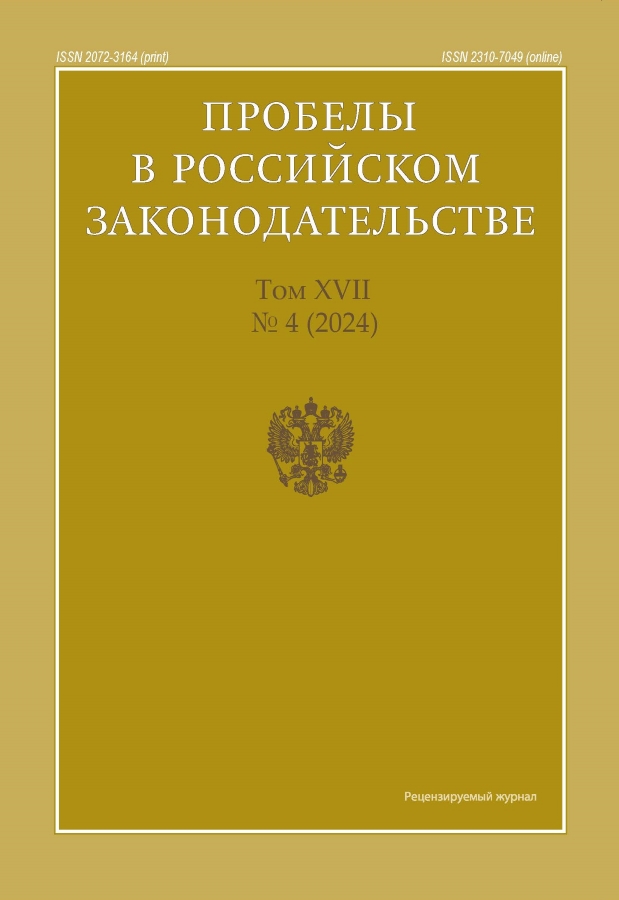Psychological Impact of the Investigator on Participants in Criminal Proceedings
- 作者: Kochesokova Z.K.1
-
隶属关系:
- North Caucasus Institute for Advanced Studies (branch) of the Krasnodar University of the Ministry of Internal Affairs of Russia
- 期: 卷 17, 编号 4 (2024)
- 页面: 193-198
- 栏目: Criminalistic, procedural and operative-search measures to counter crime in the globalization conditions
- URL: https://journals.eco-vector.com/2072-3164/article/view/636436
- EDN: https://elibrary.ru/HOVXIP
- ID: 636436
如何引用文章
详细
This article is dedicated to analyzing the psychological impact of investigators on participants in criminal proceedings, highlighting key aspects and determinants that influence the interrogation process and outcome. It particularly addresses the issue of assessing the reliability of testimonies, taking into account the individual psychological characteristics of the interviewees and the effect of external circumstances. The moral and ethical foundations and principles upon which the investigator’s activities should be based are discussed, as well as the specifics of reflexive interaction and its impact on interrogation strategy. Special attention is given to defining the boundaries of permissible psychological influence in accordance with legislation and ethical norms, and issues of unacceptable methods of influence, including coercion and deception, are discussed. The article emphasizes the importance of scientifically grounded approaches and theoretical knowledge for the effective and lawful conduct of investigative actions.
全文:
作者简介
Zalina Kochesokova
North Caucasus Institute for Advanced Studies (branch) of the Krasnodar University of the Ministry of Internal Affairs of Russia
编辑信件的主要联系方式.
Email: zalina-solnce@mail.ru
SPIN 代码: 2873-0958
Cand.Sci. (Econ.), Associate Professor of the Department of Special Disciplines
俄罗斯联邦, Nalchik参考
- “Criminal Procedure Code of the Russian Federation” dated December 18, 2001 N 174-FZ // SZ RF. 2001. N 52 (part I). Art. 4921.
- “Criminal Code of the Russian Federation” dated June 13, 1996 N 63-FZ // SZ RF. 1996. N 25. Art. 2954.
- Decision in case 1-48/2017. Website URL: https://rospravosudie.com/ (Access date: 04/05/2024).
- Determination of the Judicial Collegium for Criminal Cases of the Armed Forces of the Russian Federation dated February 16, 2012 No. 12-O12-5. Website URL: https://www.consultant.ru/cons/cgi/online.cgi?req=doc&base=ARB&n=253421&ysclid=lumv1kb8hb839376056#n45U59UCyX22SdA81 (Date of access: 04/05/2024).
- Baranchuk V.V. Reflection as a way of establishing psychological contact with the person being interrogated during the pre-trial investigation // Theory and practice of legal consciousness. Vol. No. 12. 2019. pp. 95-101.
- Ivanov V.F. Criminal legal assessment of coercion. —Author’s abstract. dis. Ph.D. legal Sci. — Saratov, 2019. — P. 59.
- Knyazkov A.S. Legality and ethics of methods of influencing the suspect and accused during interrogation // Criminal justice. Vol. No. 11. 2018. pp. 71-80.
- Forensics: textbook / E.R. Rossinskaya. — M.: Norma: INFRA-M, 2019. — P. 302.
- Yuzhaninova A.L. Features of the use of special psychological knowledge in the investigation of group crimes // Problems of criminal proceedings, criminology and forensic examination. Saratov: Publishing House of the State Law Academy, 2018. No. 1(3). pp. 74-78.
补充文件








